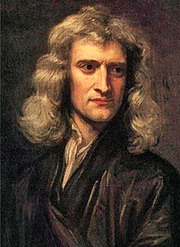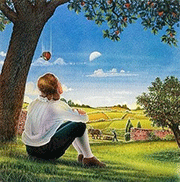E-Archive
Off the Beaten Track
in Vol. 18 - March Issue - Year 2017
In A Contemplative Mood


The principal burst into the classroom without knocking and announced that all students were to gather their personal belongings and to go home immediately. The plague had broken out in the nearby village and the danger of contagion was serious, dramatically serious. Without saying a word and with barely a nod to his fellow students, the young man gathered his books, swept his coat off the back of his chair and scurried towards the door.
***
Isaac Newton was born on 4th January 1643 in Woolsthorpe, a hamlet about a hundred miles north of London. His father had died three months before Isaac was born and the young boy was raised by his maternal grandmother after his mother remarried and followed her new husband to a nearby town. At grammar school, Newton studied Latin, Greek and mathematics, but his was an unhappy childhood and he had a lot of pent-up anger towards his mother and his stepfather. After his mother was widowed for a second time, she returned to Woolsthorpe and she removed her son from school, attempting to turn him into a farmer. Isaac hated farming and the attempt ended in total failure. These negative experiences scarred Newton for the rest of his life, leaving him with a stammer and with recurring bouts of depression.
Luckily, the master of the King’s School in nearby Grantham convinced his mother to allow the teenager to return to school so that he could finish his education. Isaac managed to transform his negative feelings into a voracious appetite for learning, finishing his course as the top-ranked student. He then enrolled at the University of Cambridge’s Trinity College in 1661, where he developed a keen interest in physics, mathematics, optics and astronomy. He also read many works by modern philosophers, especially Descartes, and religious texts.
Newton received his bachelor’s degree in 1665 and decided to stay on for his master’s, but an outbreak of the plague forced the university to shut down. It was while he continued his private studies at home that Isaac developed some of his most famous studies on optics, calculus and gravitation. In this period the myth of the falling apple was born, when it is said that an apple falling on Newton’s head while he was sitting under a tree inspired his law of universal gravitation.
Upon returning to Cambridge in 1667, Newton devoted himself to his studies on optics and on the composition of light. His observations led him to develop the reflecting telescope, a marked improvement over current models based on the refractive principle. The Royal Society was so impressed by this invention and by his studies that Newton was inducted into this venerable institution in 1672. However, his conclusion that white light was actually composed of all the colors in the spectrum, together with his assertion that light was composed of particles and not of waves, drew sharp criticism by other members of the Royal Society, notably Robert Hooke, who would not approve theories going against long-accepted truths. His strong and prolonged dispute with Hooke led Newton to have a nervous breakdown and to withdraw from the public eye in 1678.
During his seclusion, Isaac returned to his previous studies on gravitation and also experimented with alchemy. The English astronomer Edmund Halley paid Newton a visit in 1684 and, when he saw that Newton had calculated the elliptical paths of celestial bodies, he encouraged Newton to organize and present his work to the scientific community. This led to one of the most important works of modern science, the Philosophiæ Naturalis Principia Mathematica (Mathematical Principles of Natural Philosophy), published by Newton in Latin in 1687. Commonly known as Principia, this book contained the three laws of motion and the law of universal gravity and earned Newton universal acclaim.
In 1704 Newton published his book entitled Opticks, which is mainly a collection of his earlier groundbreaking research on light refraction and the color spectrum.
What about the myth of the falling apple? Did this episode actually happen? In 1752, Isaac’s good friend William Stukeley published a biography of the great English scientist in which he relates that, during one of his visits to Woolsthorpe, “After dinner, the weather being warm, we went into the garden, and drank thea under the shade of some apple trees… he told me, he was just in the same situation, as when formerly, the notion of gravitation came into his mind… occasion’d by the fall of an apple, as he sat in a contemplative mood.”
By Giovanni Gregorat, Contributing Editor MFN
Author: Giovanni Gregorat



























